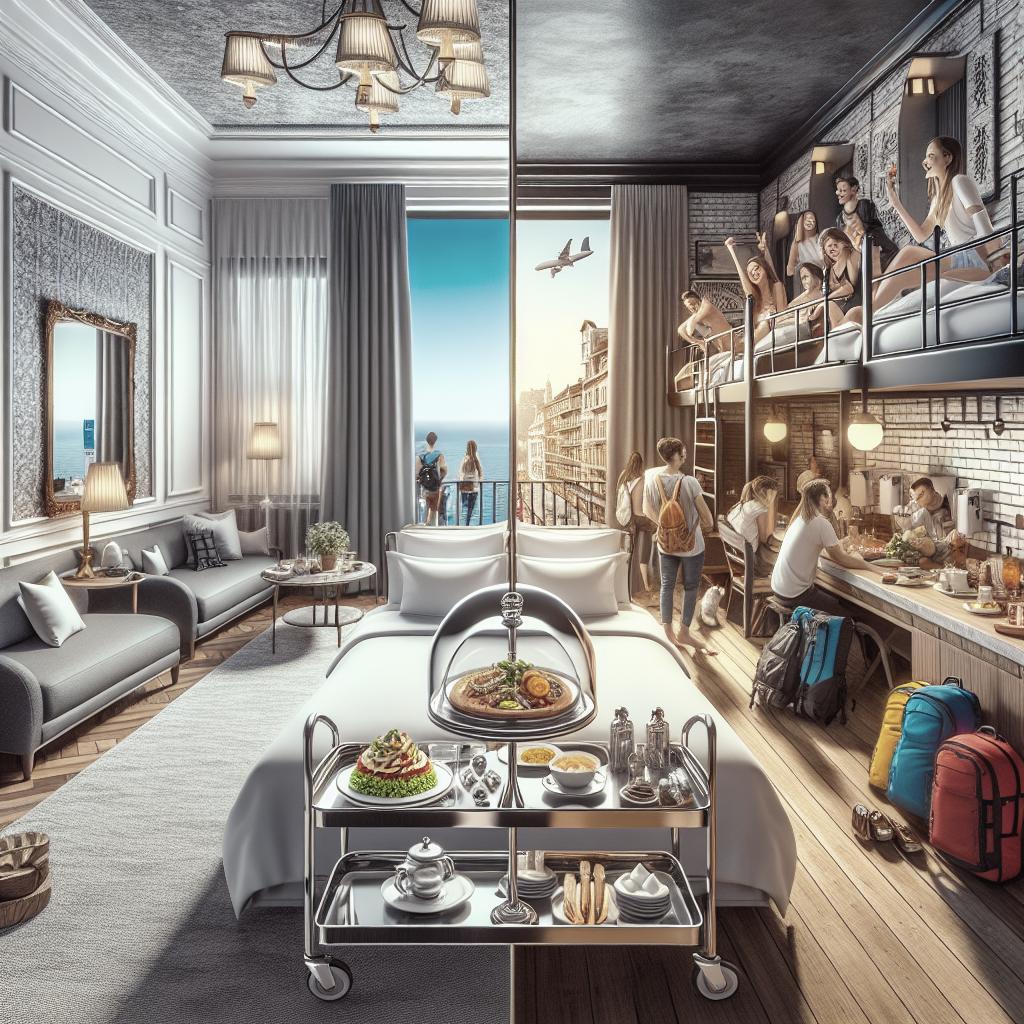“`html
Hotels vs. Hostels: Understanding the Differences
Choosing between a hotel and a hostel can influence your travel experience, budget, and interactions with people. While hotels offer more privacy and luxurious amenities, hostels provide budget-friendly accommodation and a sense of community. This article delves into the significant differences between hotels and hostels concerning their appearance, amenities, privacy levels, the experience they offer, their target customers, activities, work conveniences, and safety. Whether you’re on a leisure trip or a work-related journey, knowing these distinctions can enhance your stay and suit your travel style.
Catalonia Hotels & Resorts
Catalonia Hotels & Resorts is a prime example of a hotel chain that offers luxury, comfort, and comprehensive services. With properties located in key tourist destinations, it caters to travelers looking for a premium lodging experience. Catalonia properties usually feature elegant designs, spacious rooms, and extensive amenities, embodying what travelers often expect from hotels – a seamless blend of convenience and style.
In contrast, hostels, such as those within the Catalonia region, might present a more localized and authentic feel but with shared lodgings and common spaces. While Catalonia Hotels & Resorts are tailored for comfort and indulgence, hostels in the area often provide a culturally rich experience at a more accessible price point, drawing backpackers and budget travelers.
Appearance
Hotels are typically designed for aesthetics, presenting a polished and cohesive exterior and interior appearance. When you enter a hotel, you are greeted with grandeur—marble floors, luxurious lounges, and elegantly decorated rooms that reflect a particular theme or brand identity. Such presentation aims to create an atmosphere of relaxation and indulgence, appealing to guests seeking a retreat.
Hostels, in contrast, embrace a more casual and eclectic appearance. They may feature vibrant and artsy decor that reflects the local culture and community vibe. Unlike hotels, the interiors of hostels are often personalized with murals, local artwork, and communal spaces designed for social interaction. The focus here is less about uniformity and more about character and inclusivity.
Amenities
Hotels, particularly top-tier ones, pride themselves on offering a plethora of amenities. Guests can expect dining options, room service, fitness centers, swimming pools, and sometimes even spa facilities. The level of service is designed to meet a variety of needs, providing a holistic accommodation experience where convenience is prioritized.
Hostels generally offer more basic amenities, with an emphasis on communal shared spaces. Most provide communal kitchens where travelers can cook their meals, common rooms for relaxation and socialization, and laundry facilities. Some modern hostels have started incorporating additional features like free Wi-Fi and organized tours, but the baseline remains budget-focused and community-oriented rather than luxury-driven.
Privacy
Privacy is a significant differentiator between hotels and hostels. Hotels offer private rooms with en-suite bathrooms, ensuring a high level of privacy for guests. Such arrangements cater to the needs of travelers looking for personal space and tranquil environments, making hotels ideal for those who value their privacy.
Hostels, on the other hand, are known for their shared accommodations. Dormitory-style rooms with shared bathrooms are typical, where multiple travelers bunk together. While this setup naturally lacks privacy, it promotes social interactions. Some hostels offer private rooms, but they still encourage a community-driven atmosphere, which can be appealing to solo travelers or those wanting to socialize.
Experience
The experience at a hotel is generally centered around comfort and service. Guests are often pampered with attentive staff, room service, and on-site amenities, which contribute to a relaxing and convenient stay. Hotels aim to provide an escape from daily life, often offering experiences and services that reflect the surrounding location in a luxurious manner.
In contrast, the hostel experience is more about community engagement and adventure. Staying at a hostel often means meeting like-minded travelers, sharing stories, and sometimes participating in group activities or tours. This creates a sense of camaraderie and provides travelers with a unique opportunity to immerse themselves in local cultures and experiences that might not be as accessible when staying at more isolated hotels.
Target Customers
Hotels are typically geared towards a diverse clientele, ranging from business travelers to families looking for comfort and convenience. The broad spectrum of amenities provided appeals to those seeking a worry-free stay, with various services tailored to different needs and purposes of visits, including corporate events and family vacations.
On the flip side, hostels primarily target budget-conscious travelers, often attracting backpackers, solo travelers, and young adventurers. The appeal lies in affordable rates and the social environment, catering to those who prefer spending less on accommodation and more on exploring or experiencing local cultures and activities.
Activities
Hotel activities usually include on-site leisure and wellness activities such as spa treatments, guided city tours, and special events aligned with local festivals or themes. This approach ensures that guests have enriching options without needing to leave the property, focusing on luxury and convenience.
Hostels, however, emphasize group activities and cultural immersion. Many offer free or low-cost tours, pub crawls, cooking classes, and other sociable events—often organized by the establishment or fellow travelers. These activities are designed to foster community and provide an affordable way for travelers to gain deeper insights into local traditions and lifestyles.
Working
Hotels often cater to business travelers by providing business centers, meeting rooms, and high-speed internet access, offering an environment conducive to work-related tasks. Many hotels position themselves as suitable for conferences and workshops, with facilities that support networking and professional gatherings.
Workspaces in hostels are generally less formal. Some hostels offer shared workspaces or lounge areas where digital nomads can work, but the facilities might not be as robust as those offered by hotels. The atmosphere in hostels is less business-oriented, making them suitable for casual work tasks rather than professional business meetings.
Safety
Safety is a priority in hotels, with most offering 24-hour security, key card access, and staff available to assist in emergencies. The infrastructure of a hotel, often including secure parking areas and surveillance cameras, contributes to the guests’ sense of personal security while on the premises.
In hostels, safety measures vary, but many now offer secure lockers for belongings and key card access to dormitories. The less formal setting may require travelers to exercise more personal responsibility over their belongings. Despite this, hostels have become increasingly vigilant in improving security measures, providing guests with a safe experience that respects both budgetary constraints and comfort.
Final Thoughts
The choice between staying in a hotel or a hostel depends heavily on the traveler’s objectives, budget, privacy preferences, and desired experiences. Both accommodations offer unique advantages, suiting different travel styles and expectations.
| Aspect | Hotel | Hostel |
|---|---|---|
| Appearance | Elegant, uniform, themed | Casual, eclectic, vibrant |
| Amenities | Luxurious, comprehensive | Basic, community-focused |
| Privacy | High, private rooms | Low, shared rooms |
| Experience | Comfort-focused, relaxing | Community-driven, adventurous |
| Target Customers | Business travelers, families | Budget-conscious, backpackers |
| Activities | On-site leisure, luxury-focused | Group-based, cultural immersion |
| Working | Business facilities, formal | Casual workspaces, informal |
| Safety | 24-hour security, structured safety measures | Secure lockers, variable |
“`


